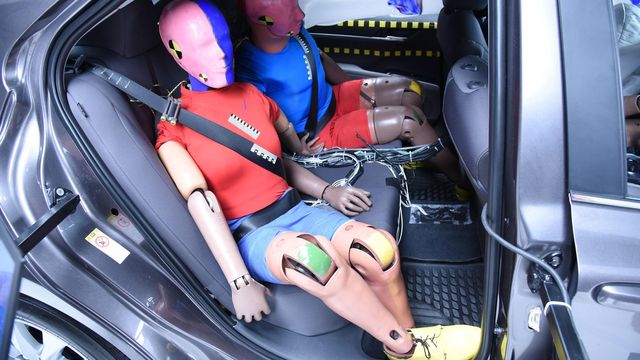Legislative apathy prompts state panel to abandon push for tougher seat belt laws
Advocates for child safety said Monday they won't ask state lawmakers for tougher seat belt laws next year because the General Assembly has ignored previous pleas for stricter laws.
Posted — UpdatedThe state Child Fatality Task Force has pushed for years for tougher penalties for drivers whose back-seat passengers aren't buckled up.
Passengers in the back who don't wear a seat belt often become projectiles in a crash. In fact, more fatal or serious injuries happen to unrestrained passengers in the back than the front, according to data compiled by the state Division of Motor Vehicles, and having an unrestrained passenger in the back in a crash increases the chance the driver and front-seat passenger will die.
"This is nothing more than physics. That projectile is going to do some damage," said Brevard Police Chief Phil Harris, a task force member. "By definition, somebody in the back seat is always going to be a threat to somebody in the front seat in an accident."
According to Child Fatality Task Force statistics, more than 42,200 children age 12 and under were hurt or killed in crashes statewide between 2015 and 2019. Thirty percent of the 152 who were killed and the 621 who suffered severe injuries weren't restrained.
Under state law, rear-seat passengers are required to wear seat belts. But the fine is just $10 – it's $25 and two points on a driver's license if the passengers are younger than 16 – and police can't pull anyone over to enforce it.
For four years, the Child Fatality Task Force asked lawmakers to increase the fine for older passengers to $25 as well and to make it a "primary infraction," meaning law enforcement could stop drivers if they spotted people not wearing seat belts in the back seat.
The change could save 10 to 30 lives a year, as well as at least $100 million in related economic costs, according to research by Daniel Findley, director of the Institute for Transportation Research and Education at North Carolina State University.
But lawmakers haven't acted on it, and with the ongoing pandemic, task force members said they're even less likely to do so during the 2021 legislative session.
"The momentum for occupant protection laws has waned," said Alan Dellapenna, task force co-chair and head of the Injury and Violence Prevention Branch of the state Department of Health and Human Services. "I‘m a realist. I don’t think it’s going to be on anybody’s radar screen this year."
Some members said they fear the same public sentiment against state and local mask mandates could extend to seat belt laws. Others expressed concern about adding reasons for traffic stops in the current political climate.
"You've just got a lot of folks out there that don't want any more rules about what you've got to do," said Martha Sue Hall, task force co-chair and a member of the Albemarle City Council.
So, the panel instead agreed to ask for the back seat seat belt issue to be added to in driver's education courses to raise awareness.
Related Topics
• Credits
Copyright 2024 by Capitol Broadcasting Company. All rights reserved. This material may not be published, broadcast, rewritten or redistributed.





